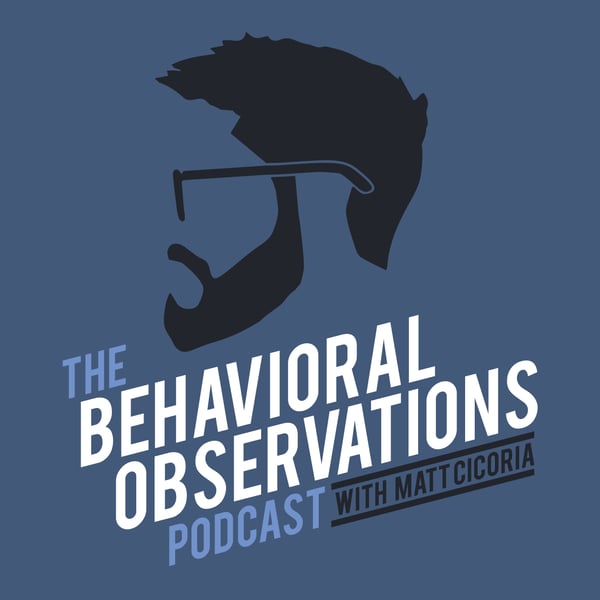A Liberated Mind: Session 92 with Steve Hayes
The Behavioral Observations Podcast with Matt Cicoria
Matt Cicoria
4.8 • 648 Ratings
🗓️ 21 August 2019
⏱️ 87 minutes
🧾️ Download transcript
Summary
Steve Hayes returns to discuss all things ACT, RFT, and his new book, A Liberated Mind: How to Pivot to What Really Matters. We begin the show with a quick tutorial of sorts on Relational Frame Theory, as well as it’s relationship with Acceptance and Commitment Therapy. We then spend quite a bit of time discussing the use of ACT in the context of preventing and responding to staff burnout. We also discuss managing “difficult people,” optimizing staff performance, and other aspects of management and supervision. Along the way, we frequently reference A Liberated Mind. To be candid, to say that this book is a big deal is a bit of an understatement. As Steve explains, A Liberated Mind is being published by one of the largest publishing houses in the world, which means that our science will have an opportunity to be disseminated in a way that we haven’t seen before. In addition to the book, we discussed a few other resources, including: The Prosocial.world website. The Maslach Burnout Inventory. Bond & Bunce (2000). Bond & Hayes (2002). Steve's website, where you can get his free ACT Mini-Course. Get Out of Your Mind and Into Your Life. This episode is brought to you by the following: Behavior University. Behavior University provides university-quality continuing education for everyday practitioners. To learn more about their CE offerings, please visit behavioruniversity.com/observations. The First Annual Tate Behavioral Conference taking place on October 25th in Springfield, Massachusetts, featuring presentations by Megan Miller, Ryan O'Donnell, Yours Truly, and Kim Berens. It will also include a live recording of the Behavioral Observations Podcast with my interview with Kim Berens. Here are a few other important details: 6 BACB CE credits (including 1.5 Ethics CEs) Doors open for registration and coffee at 8:00 am Speakers begin at 9 am and end at 5 pm Lunch included Oh, and save 15% off of your registration by using the promo code, "Matt" GoLotus. Go Lotus is an intuitive and easy to use, practice management system. It handles every aspect of practice management from data collection, to scheduling and billing, and more. It is so simple your entire team can be up and running in less than an hour. Listeners who use the promo code MATT, the first 100 people will receive 90 days of our data trackers completely free. And by signing up, you’ll then receive an additional discount of 25% off the first 12 months. For more info, head over to golotus.com/register.
Transcript
Click on a timestamp to play from that location
| 0:00.0 | Hey, everyone, before we get to today's episode, I want to tell you about a fantastic event that I'm excited to be part of. |
| 0:12.3 | It's the first annual Tate Behavioral Conference, which will be held on October 25th in Springfield, Massachusetts. |
| 0:19.3 | It'll feature presentations by podcast favorites like |
| 0:22.1 | Megan Miller, Ryan O'Donnell, and Kim Barron's. I'll be doing my own talk as well, and we'll |
| 0:27.6 | close out today with a live recording of my interview with Dr. Kim herself. For more information, |
| 0:33.1 | go to behavioral observations.com forward slash Tate 2019. Springfield Mass is a short drive from many |
| 0:40.6 | parts of the Northeast, so I hope to see you there. Okay, on to today's show. I'm really excited |
| 0:47.0 | to have Dr. Steve Hayes come back on the podcast. We begin the show with a quick tutorial of sorts |
| 0:51.4 | on relational frame theory, as well as its relationship with |
| 0:54.5 | acceptance and commitment therapy. We then spend quite a bit of time discussing the use of act in the |
| 0:59.4 | context of preventing and responding to staff burnout. We also discuss managing, quote-unquote, |
| 1:05.6 | difficult people, optimizing staff performance, as well as other aspects of management and supervision. |
| 1:12.6 | Throughout the interview, we discuss his newest book, which is called A Liberated Mind, |
| 1:16.8 | how to pivot towards what really matters. To be candid, to say that this book is a big deal, |
| 1:22.3 | is a bit of an understatement. As Steve explains, A Liberated Mind is being published by one of the largest publishing |
| 1:28.5 | houses in the world, which means that our science will have an opportunity to be disseminated |
| 1:33.3 | in a way that we haven't seen before. |
| 1:36.1 | There are many take-home lessons from this conversation, so I hope you enjoy it as much as I did. |
| 1:41.0 | The show notes of this episode has links to where you can learn more about a liberated |
| 1:44.2 | mind, as well as many other topics we covered. Before we get to the interview, I want to let |
| 1:49.5 | you know that this episode is brought to you by Behavior University. Behavior University provides |
| 1:54.5 | university quality continuing education for everyday practitioners. To learn more about their |
... |
Please login to see the full transcript.
Disclaimer: The podcast and artwork embedded on this page are from Matt Cicoria, and are the property of its owner and not affiliated with or endorsed by Tapesearch.
Generated transcripts are the property of Matt Cicoria and are distributed freely under the Fair Use doctrine. Transcripts generated by Tapesearch are not guaranteed to be accurate.
Copyright © Tapesearch 2025.

